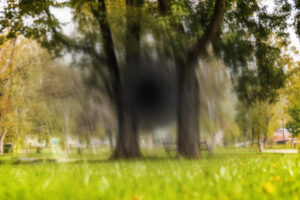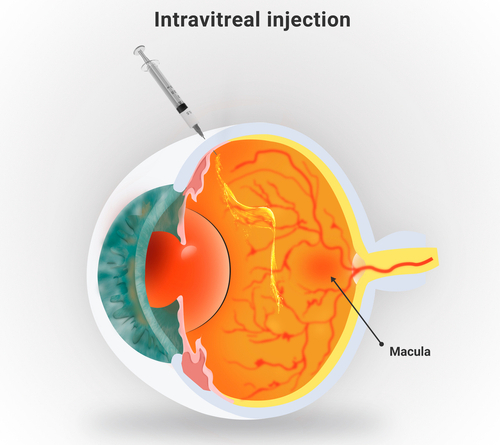Macular Degeneration
Imagine not being able to clearly see the display on a clock, information on a road sign, or even the facial features of a loved one. This is the daily experience for many people with macular degeneration, a progressive eye condition.
For people over fifty, it’s the leading cause of vision loss. Because the damage caused by the condition is irreversible, early detection and treatment to slow its progress is crucial for preserving vision.
What is Macular Degeneration?
Macular degeneration is an eye disorder that causes deterioration of the macula, which is the central portion of the retina responsible for sharp, detailed central vision. The macula is made up of millions of light-sensing cells that provide clear vision for reading, driving, recognizing faces, and seeing fine details.
This deterioration gradually reduces your ability to see objects that you are looking at directly. The retina, located in the back of the eye, processes incoming light into images that are transmitted through the optic nerve to the brain.
The retina consists of two main regions: the peripheral retina and the macula. The peripheral retina processes light from the outer edges of a person’s field of vision, providing peripheral vision.
The macula, a small central area of the retina, is responsible for processing light from the center of the visual field, enabling sharp, detailed central vision essential for tasks such as reading, recognizing faces, and discerning fine details. If the tissue of the macula begins to break down, however, the retina may no longer effectively process light coming from the patient’s central vision.
As a result, the person may have difficulty making out fine details or seeing anything at all in this area of their vision. At the same time, their peripheral vision, what they can see on the outside edges of their vision, usually remains unaffected.
What Causes Macular Degeneration?
Researchers still aren’t sure about what exactly causes macular degeneration, but they have identified certain groups that tend to have higher incidences of the disease. Women, for example, are more likely to develop macular degeneration than men, as are Caucasians more than African Americans.
Macular degeneration also appears to be hereditary, with significant occurrences in successive generations of families. However, people over fifty are the group with the highest numbers of the disease.
For this reason, the condition is often called age-related macular degeneration (AMD). You may also have a higher risk for macular degeneration if you:
- Smoke
- Have high blood pressure or cholesterol
- Have diabetes
What Are the Symptoms of Macular Degeneration?
 Like many other progressive eye diseases, macular degeneration often doesn’t display symptoms early on. As it develops, though, you may eventually notice problems in your central vision, including:
Like many other progressive eye diseases, macular degeneration often doesn’t display symptoms early on. As it develops, though, you may eventually notice problems in your central vision, including:
- Objects appearing distorted or blurred, or abnormally shaped or colored
- A sense that objects move or “jump” suddenly when focused upon
- Increasing difficulty with reading or driving
- An inability to see fine details
- A blind spot in the center of your vision
What is Wet Macular Degeneration?
Macular degeneration has two forms described as wet and dry. The rarer and more serious of the two is wet macular degeneration.
Wet macular degeneration occurs when new blood vessels begin to develop under the retina. Because these vessels are abnormal, they tend to be weak and can easily leak blood or other fluids.
They may also cause scarring on the surface of the macula.
What is Dry Macular Degeneration?
The more common dry macular degeneration happens when the tissues of the macula start to thin, something that can occur as a consequence of aging. As this happens the macula begins to lose cells necessary for processing light.
Small bits of protein called drusen may develop on the surface of the macula as well, further affecting its function. These changes to the macula slowly erode the retina’s ability to process light from central vision.
How is Macular Degeneration Treated?
Any vision loss that occurs due to macular degeneration is irreversible. However, treatment can preserve your vision by stopping or slowing the condition’s progression.
The success of this strategy largely depends on how early the condition is diagnosed. The earlier the detection, the better the treatment outcome.
That’s why it’s important to begin annual eye exams by age forty or earlier if you have a family history of macular degeneration. Your eye doctor can detect the condition even before you notice any symptoms.
While research continues toward developing new treatments or improving older ones, much can still be done to reduce the negative consequences of macular degeneration. Today, there are a number of options for preserving more of their vision from the damage caused by this serious eye condition.
AREDS Vitamin Regimen
The Age-Related Eye Disease Studies (AREDS), a series of clinical trials sponsored by the National Eye Institute, found that regular doses of certain vitamin supplements could slow the progression of dry macular degeneration. Since then, this vitamin regimen has become a common therapy in macular degeneration treatment, which can also be combined with other treatments.
This regimen includes daily intake of:
- Vitamin C
- Vitamin E
- Zinc
- Copper
- Lutein
- Zeaxanthin (the last two antioxidants)
Anti-VEGF Injections
 VEGF is a protein within the eye that tells the body to produce new blood vessels. Anti-VEGF medications like Aflibercept (Eylea®) and Ranibizumab (Lucentis®) block the production of VEGF, which then reduces the growth of new blood vessels and the subsequent damage they might have caused to the macula. Although this drug intervention won’t cure wet macular degeneration, it can slow its progress.
VEGF is a protein within the eye that tells the body to produce new blood vessels. Anti-VEGF medications like Aflibercept (Eylea®) and Ranibizumab (Lucentis®) block the production of VEGF, which then reduces the growth of new blood vessels and the subsequent damage they might have caused to the macula. Although this drug intervention won’t cure wet macular degeneration, it can slow its progress.
After numbing the eye, the medication is injected into the vitreous, the gel-like substance that makes up the bulk of the eyeball. The injections can be repeated and are often combined with other types of treatment.
Dominion Eye Care physicians do not perform these injections. If your eye doctor believes it is time for anti-VEGF treatment, they will refer you to a retinal specialist for treatment.
Are you experiencing symptoms of macular degeneration? Schedule an appointment at Dominion Eye Care in Manassas, VA, today!

